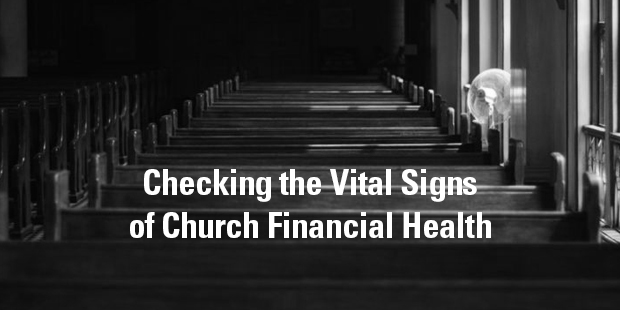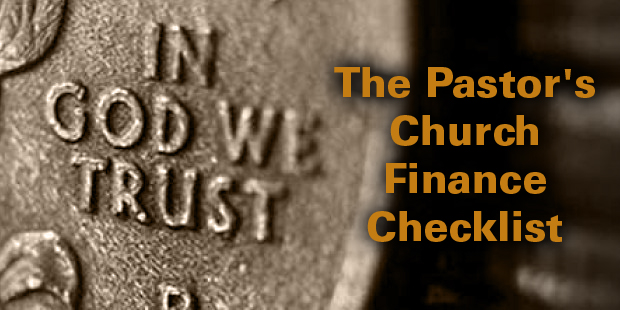The intersection of faith and finance is never easy to navigate as a local church leader.
The topic of money is inescapable for anyone who leads a church, so while many of us would rather lead people toward Jesus, we must also embrace the truth that the functions of a local church do not operate for free.
In this post, I’ve listed ten big mistakes to avoid on the subject of finance. There are many more detailed issues involving numbers and percentages, but that’s for another post. Let me give you one example.
When you step into the realm of numbers, there are so many variables. For example, the majority of churches would hold 50% of their budget as a maximum investment for total compensation for all (staff) personnel. A church plant, however, would be a little higher. And in very large churches, approximately 10,000 and larger, that number drops to approximately 35-40%. There are also considerations of variables from the cost of living in the city you’re in, to your current ministry emphasis. That’s just one item of dozens.
For this article, let’s look at principle driven issues that we must all lead well.
Ten Finance Mistakes:
1) Abdication of responsibility by the lead pastor
When a well-intentioned pastor relinquishes a huge amount of their direct involvement in the finances of the church to various committees and boards, they are usually asking for trouble.
The justification is often that they are trained as a pastor and Bible teacher, not a businessman. It’s good to have capable board members you trust, but if you end up out of the picture, you may soon no longer be leading your church.
2) Failure to connect the vision to the revenue
Projecting revenue and setting the annual budget carries a much larger scope than how to meet expenses. Vision and faith have always been the primary driving factors in cultivating generosity within a local church.
Start with your vision, then identify the major financial needs to achieve the vision. Compare those findings to the anticipated revenue, make any needed cuts, then finalize the budget.
3) Ignoring the tension between faith and prudence
Where do you draw the line between faith and fiscal responsibility? That has always been a great tension for any church leader. Spiritual leaders know that God will meet the needs, yet it’s not uncommon to have a financial shortfall. Prayer is vital and so is leadership.
Declaring“if we just believe” won’t increase the offerings. It’s of critical importance to lean into great faith, but it’s also vital to exercise strong financial wisdom in stewardship. The combination of those two together will serve you well.
4) Taking on too much debt
Many churches believe debt in any amount is to be avoided at all costs. I think we would all agree that in general, the less debt, the better. But there are some circumstances where debt is required to advance the Kingdom mission.
Your church’s ability to balance cash on hand and revenue will guide you in a proper amount of debt. Some experts will say that a debt level of two to three times your current income is acceptable, but that should be the maximum. Others suggest that one to two times your current income is the max. Consider factors like how well your church is growing to help you know what is an acceptable debt level if any at all.
5) Ignoring the budget
I find this one most surprising. Church leaders will do a good job working through a well-prepared budget. Then they ignore it. They go over in any category they choose and literally run out of money before the end of the fiscal year.
In effect, they are making it up as they go which is obviously a bad idea. Budgets are not straight-jackets, but they are strong boundaries put in place for good reasons. The practice of discipline in your budget carries over into the rest of your ministry.
6) Allowing donors to dictate the vision
It is unwise to allow donors to direct their monies to specific purposes of their choosing. We all know stories of a person with resources who says “If you do this, I’ll give this.” Resist that temptation with all you’ve got!
The pressure is great to cave in and receive the money, but we must trust God to meet the needs of the church without allowing anyone to hijack the vision.
Instead, use those moments for courageous discipleship and have an honest conversation about the way God teaches us to give without strings attached.
7) Lack of training in biblical stewardship and personal finance
There are more than 2,000 scriptures on money or financially related subjects. Teaching on biblical stewardship is a vital and necessary part of the discipleship / spiritual formation process.
There are two primary platforms that all local church ministries should include. First, regular biblical teaching on Sunday mornings. Perhaps one finance series a year. Second, small group curriculum and or seminars for practical money management with a scriptural foundation.
8) Trusting those who handle the money without safeguards.
Churches often place great trust in others without appropriate safeguards to protect those we trust from temptation. Developing appropriate internal controls against fraud and embezzlement can be established by any church.
For example, the same person should not deposit offerings, write checks to vendors, and execute the payroll for the church. Many churches may only have one person in the accounting department. However, every church could include a volunteer to review bank statements on a monthly basis or form a finance committee to review monthly financial statements.
If you’re not sure where to start, Church Finance Today is a great resource for less than $5 per month.
9) Special treatment for the wealthy
James 2:1 makes it clear that we must not show favoritism. It’s a natural temptation, and the pressure is real.
“If you show special attention to the man wearing fine clothes and say, “Here’s a good seat for you,” but say to the poor man, “You stand there” or “Sit on the floor by my feet,” 4 have you not discriminated among yourselves and become judges with evil thoughts?” James 2:3-4
No church has too much money, but if it is gained by privilege rather than spiritual maturity, God’s blessing may be withheld.
10) Not carrying sufficient or appropriate insurance coverages
Regardless of the size of your church, your investment merits protection. Every church is unique and carries specific risks. These risks and levels of risk change over time.
A good review of insurance needs by a professional other than the church’s insurance broker should be done at least once a year. In a smaller church, ask a member who owns his or her business to help in this regard.
> Read more from Dan
Connect with an Auxano Navigator to learn more about Generosity in your church.

Tags: Dan Reiland, Financial Mistakes to Avoid, church finances
|
What is MyVisionRoom? > | Back to Resourcing >



















